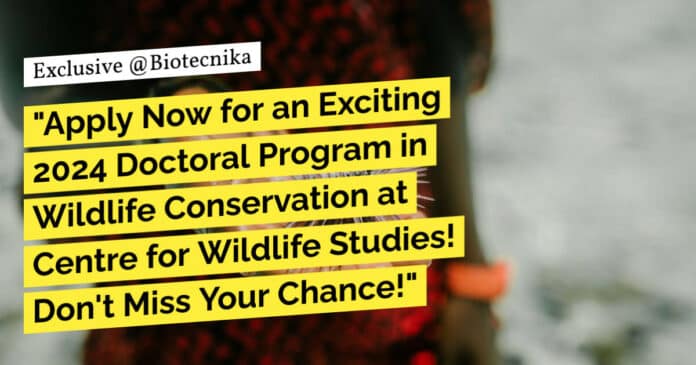
2024 Doctoral Program CWS – Admissions Open
Opportunities for Ph.D. in Wildlife Ecology and Conservation
We are excited to announce admissions to the 2024 Doctoral Program in wildlife ecology and conservation at the Centre for Wildlife Studies (CWS). The degree will be granted by the Manipal Academy of Higher Education (MAHE). We are looking for highly motivated and academically driven candidates, with a demonstrated interest in field-based research in wildlife ecology and conservation in India and Asia.
Project Opportunities Available
1. Assessing hunting practices and its impacts on wildlife in the Western and Eastern Ghats
Description: This project aims to study traditional community hunting practices in the Western and Eastern Ghats and their impacts on wildlife, using a mix of socio-ecological field surveys and community interviews. Hunting and illegal wildlife trade are the largest threats to biodiversity. This project will study community practices relating to hunting, quantify its impacts, particularly on species that are specifically targeted, and assess linkages with wildlife trade. The study will require a use of both quantitative and qualitative research methods. This research requires extensive field work spanning several months, close interaction with communities, data entry and analysis, and writing. The candidates should be motivated and
passionate about conservation, and should be familiar with both field ecological techniques for mammals, such as camera trapping and sign surveys, as well as social science survey methods.2. Projecting habitat impacts of current and adjusted infrastructure-investment plans in India
Description: Infrastructure investments have immense impacts on wildlife species and habitats. India is making significant investments in economic development. Yet the potential exists to adjust which kinds of investments are done and where, such that for the same infrastructure budget more economic development and better conservation can be achieved. With a diverse team and drawing upon the past impacts of roads and railways, we will collect significant data to permit the modeling of the likely habitat impacts of current plans as well as impacts of varied feasible adjustments. This project is in collaboration with Duke University, USA.
3. Examining bioacoustics as a tool to evaluate biodiversity
Description: Building on a strong foundation of research in the Western and Eastern Ghats, this study will use passive acoustic monitors and avian observational data (e.g. point counts or line transects) to examine biodiversity in this region. The Western and Eastern Ghats are highly diverse and dynamic landscapes, supporting natural habitats and working farms. The successful candidate will use passive acoustic monitors alongside observational transects to evaluate where and how bioacoustics can augment our understanding of community assemblage structure, diversity, and behavior of vocalizing bird species. These data will advance our knowledge of how technology can facilitate wildlife conservation, and where additional methodological and/or technological advances are needed to obtain adequate precision and accuracy to use acoustic data to track avian populations through space and time. Preferred applicants will have experience with bird observation, quantitative analysis, strong writing skills, the ability to work well in teams, and a commitment to continuous learning. The project will be a collaboration with Pomona College, USA.
4. Biodiversity, ecosystem services, and human health on coffee farms
Description: This project will build on existing data on bird and bat communities on coffee farms in the Western Ghats. The study will use mist nets to collect and analyze diet samples from birds and bats in farms that vary along a gradient from sun to shade coffee. Information on diet will be combined with using exclosures to evaluate the effect of agricultural intensification on vertebrate pest control services. Human health risk to farm workers along the diversified farming gradient will be assessed using wristbands that detect pesticide exposure and button thermometers on shoes that measure heat exposure in real time. Together, these data will advance understanding of how farmland diversification/intensification impacts biodiversity-mediated pest control, with potential benefits to human health through reduced need for chemical inputs. Preferred applicants will have experience with mist netting birds or bats, quantitative analysis, strong writing skills, and the ability to work well in partnership with private landowners and farm workers. This project is in collaboration with Colorado State University, USA.
5. Understanding human-wildlife interactions
Description: The research project will evaluate conservation programs that help farmers experiencing wildlife conflict in receiving government compensation. The Ph.D. student recruited for this project will assist in the evaluation of this conservation program. Possible avenues for evaluation are: does the program increase compensation received per conflict incident? Does the program improve attitudes towards wildlife? If the program improves access to compensation, does its implementation reduce incentives to implement private investment in reducing animal conflict? Preferred applicants will demonstrate statistical training and aptitude, experience in program evaluation, and experience in fieldwork. A background in economics is preferred, but not required. This project is in collaboration with the University of British Columbia, Canada.
6. Open topics
In addition to the positions available in different projects (as stated above), candidates with CSIR/UGC/DST doctoral fellowships are encouraged to apply, provided their interests match that of a Guide at CWS. Typically, most projects are executed in collaboration with faculty from international universities and national institutions in India.
Essential Qualifications
- Indian national /or OCI, with a postgraduate degree in natural sciences, social sciences, medical sciences, veterinary sciences, or engineering, with at least 65% marks or equivalent, and a minimum of 2 years of experience in field-based wildlife research.
Desirable Qualifications
- Demonstrated ability to write proposals and reports; Publication of scientific and popular articles; Knowledge of survey and analytical methods in ecology; Working knowledge of software such as QGIS/ArcGIS and R. UGC/CSIR-NET/GATE eligible candidates are encouraged to apply; GRE/TOEFL scores for OCI candidates.
Fellowship
- Each selected Ph.D. student will get a fellowship of Rs. 40,000, and once they successfully complete the required coursework and pass their candidacy examination the fellowships will get revised to Rs. 50,000.
How to Apply
- Please fill the format at cwsindia.org/doctoral-program/apply2024phd to apply.
- Please submit in one pdf document:
- Undergraduate transcript
- Masters’ transcript
- CV/resume
- 1-2 page personal statement identifying your main research interests from the above list (max. 2) and expanding on your relevant experience
- List and copies of scientific publications, technical reports, or popular articles published
- Students with other scholarships/fellowships: Students who have secured the DST-INSPIRE, UGC-NET, CSIR fellowships and GATE scores would also be required to attend the written entrance examination.
- Three referee statements should be sent directly to [email protected] by the referees.
- Deadline for submitting applications is March 15th 2024.
Selection Process
Applicants shortlisted based on essential and desirable qualifications would be required to appear for an in-person entrance test conducted by CWS. Those who have cleared the entrance test will be invited for an in-person/online interview with the Centre for Wildlife Studies (CWS), Bangalore. Expenses need to be borne by the candidates themselves.
Keywords: admissions, doctoral program, wildlife ecology, wildlife conservation, Centre for Wildlife Studies, CWS, Manipal Academy of Higher Education, MAHE, hunting practices, biodiversity, infrastructure-investment plans, bioacoustics, human-wildlife interactions, coffee farms, Indian national, field-based wildlife research, fellowship, how to apply, selection process. 2024 Doctoral Program CWS – Admissions Open. Please ensure you are subscribed to the Biotecnika Times Newsletter and our YouTube channel to be notified of the latest industry news. Follow us on social media like Twitter, Telegram, Facebook
































